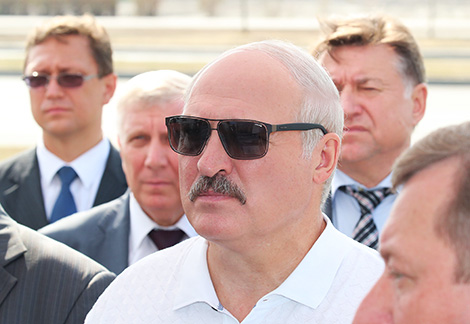“This is an attack on democracy,” said Ursula von der Leyen, president of the executive European Commission. “This is an attack on freedom of expression. And this is an attack on European sovereignty. And this outrageous behaviour needs a strong answer.”
Von der Leyen added that a €3 billion EU investment and economic package for Belarus would remain on hold until Belarus “turns democratic”.
Officials also said individual sanctions would be applied against any officials deemed to have taken part in the forced landing.
SANCTIONS UNLIKELY TO HAVE BIG IMPACT EXCEPT FORCING MINSK CLOSER TO MOSCOW
Belarusian leader Lukashenko and many other officials from his government are already under sanctions, and the three billion Euro aid package is not huge in terms of the Belarusian economy.
Past sanctions have had little effect on Lukashenko or his government.
The U.S. and the EU imposed sanctions on top Belarusian officials amid months of protests, which were triggered by opposition allegations of cheating in Lukashenko’s re-election in August 2020. More than 34,000 people have been arrested in Belarus since then and thousands beaten.
Even opposition leaders were skeptical.
Katarina Shmatsina, fellow at the Belarusian Institute for Strategic Studies, told CNBC TV that sanctions would only drive Lukashenko closer to Moscow. “We do not expect a new wave of Western sanctions to have any further real impact on the domestic situation, and they are likely to drive Belarus even closer to Russia,” she said.
Indeed, it is Russia that seems to be the real winner.
Despite a wishy-washy ‘union state” agreement with Russia, Lukashenko has drawn the line at anything which would weaken the country’s sovereignty. When Moscow has in the past pressed the issue, he has at times been combative.
In the last two weeks, he has made particularly strident statements, emphasising the extreme destruction the country underwent during World War II, when, inconveniently squeezed between Nazi and Soviet forces, up to a third of the population is estimated to have died, the highest figure of any land. Diplomats who have been based in Minsk often refer to Lukashenko as “walking the line” – simultaneously flirting with Europe – or westward-leaning Georgia or Ukraine – while fully conscious that economically, his country has little choice but to be tied to Russia.
Russian Foreign Minister Sergei Lavrov said the episode needed to be investigated — but that it couldn’t be rushed. Moscow and Minsk have close political, economic and military ties and Lukashenko has relied on Russian support amid Western sanctions.
The Belarusian Foreign Ministry bristled at what it described as “belligerent” EU statements, insisting Minsk acted “in full conformity with international rules”.
It ordered all Latvian diplomats out of the country after the Belarusian flag was replaced Monday with the white-and-red one used by the opposition at the world ice hockey championship in Riga, Latvia. Belarus had been due to co-host the event, but it was moved altogether from Minsk amid the international outcry over the crackdown.
Lufthansa said a flight from Minsk to Frankfurt with 51 people aboard was delayed Monday following a “security warning.” It was allowed to depart after the plane, passengers and cargo were searched.
On Sunday, flight tracker sites indicated the Ryanair flight was about 10 kilometres (6 miles) from the Lithuanian border when it was diverted. There were conflicting reports on what exactly happened.
“He freaked out when the pilot said the plane is diverted to Minsk. He said there’s death penalty awaiting him there,” passenger Marius Rutkauskas said after the plane finally arrived in Vilnius.

